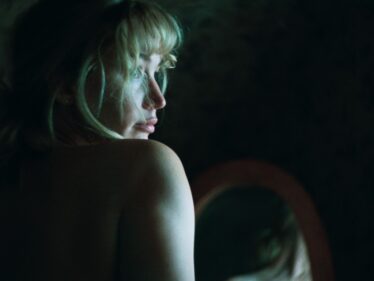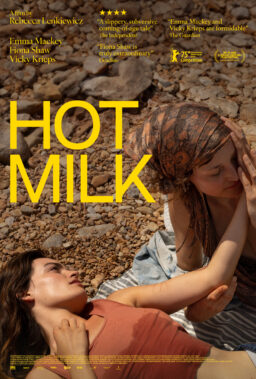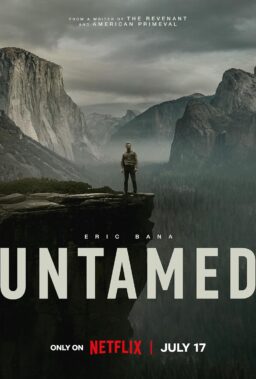CANNES, France — Sometimes at the Cannes Film Festival you see a masterpiece that strikes you in a certain way, and you are sure it wi ll be a success all over the world. Sometimes you are right, but sometimes you are wrong. Last year at Cannes, I saw “Shy People,” a bold and unusual drama about a chic magazine writer who ventures into the bayous of Louisiana to seek a long-lost cousin who turns out to be a cross between a swamp woman and a force of nature. The film had such an effect on me that I was sure it would be felt by others.
In a way, I was right. Barbara Hershey won the best actress award at the 1987 festival, for her performance as the woman on the bayou.
But in another way, I was wrong because the film has never received the kind of sendoff or reception I would have expected. Part of that may be because of the financial difficulties of the Cannon Group, which produced the film but then ran short of funds and did not release it with much publicity. The movie opened here and there in January, and then drifted into that hinterland of films that you sort of lose track of. Now it finally has been released around the United States (it opened Friday at Chicago area theaters), but the timing is wrong and it will probably not attract much attention. Too bad.
And so I sit here at this year’s festival, and I remember a morning last year when I sat down to interview Barbara Hershey, and “Shy People” had still not had its premiere, and its fate was still before us.
“This is like the mad tea party,” Hershey said. We were sitting on the terrace of a room at the Majestic Hotel, and down below the street was filled with the usual crazy accumulation of people.
“I haven’t seen the film yet,” I said.
“Neither have I,” she said. “I’m seeing it tonight.”
“What do you hear?”
“The usual. Everybody says it’s great, but then what else are they going to say? Tonight will tell.”
By all accounts, it was a strange and daring film, shot by Konchalovsky on location in the bayous of Louisiana, with Hershey and Jill Clayburgh, who plays the magazine writer, up to their necks in swamp water for hours at a time. I had a good feeling about the film because of my interest in its director, Andrei Konchalovsky, a Russian emigre who made “Runaway Train” and “Duet for One” and achieved a sort of anonymous fame as the original of Shirley MacLaine’s lover “Vassily” in her autobiography “Dancing in the Light.”
I said something to Hershey about the time we’d met in Toronto, around 1970, when she was going through her mystical flower child period and had changed her name to Barbara Seagull in honor of the bird that had died while she was filming “Last Summer,” a bird she felt had made its way into her own soul.
“That was a difficult lifetime,” she said. “The one I’m living now wouldn’t know how to describe it. I was a child. That’s a lot of what that was about. I didn’t really have a notion of myself. I’m really pretty normal. I don’t live an exciting life, and my time is filled up with the usual things people fill their time with. I took an art class. I started drawing. I sat between scenes in the trailer on a set, and draw pictures of these people in Louisiana. It’s a wordless way to deal with tension, and the slow passage of time.”
We talked of the usual things. Her Seagull period. The stretch in the 70s when she was branded as an eccentric and had trouble finding word. Her 1981 horror film “The Entity,” which has been all but forgotten, but which was really her comeback, because she was so good in it, so touching, as a single mother of three kids who knew that there as something evil in the house with her, and couldn’t get the shrink to take her seriously. Then, at last, in her late 30s, came the rehabilitation of her reputation and the rebirth of her career: Roles in “The Natural,” “The Right Stuff,” “Hannah and Her Sisters” and “Tin Men.”
“I’ve had a nice few years here,” she said. “I’m grateful, but I’m not complacent. I sure don’t feel like I’ve arrived at anything. I’m not a personality actor. People don’t come to see me because of the way they know I’ll behave. I’m not a star. I believe acting is half who you are, and half what you do. You’re only capable of portraying what you’re capable of understanding. You can put on the false teeth and the nose, but you can only play the character if you can play it from somewhere inside of yourself.”
She talked of her character Lee, Hannah’s sister: “She’s in a perpetual student state. I never got the sense, even with marriage, that she would ever quite grow up. Some people eventually graduate. Lee would only let go of one man when she had a new mentor to go to.”
“How do you prepare for a character?”
“When I get the time? I’m an 11th hour actress. I only had five days’ notice for ‘The Right Stuff.’ Three days for ‘The Natural.’ For ‘Shy People,” I had a lot of advance notice for once. I’m playing this woman who lives with her sons in the middle of Louisiana, and has never left the swamp. She’s ferociously in love with her children, who are all grown. I read the script, and all I could think about was the Old Testament. When blood ties and a sense of right and wrong are more important than any possible social nicety. When I see the film tonight, I don’t know what I’ll think. But I suspect it will be very mythic, very Russian.”
A brief silence. “I can tell you really, really care about this film,” I said.
“I wasn’t trying to give that impression. But yes.”
That night I went to see “Shy People,” and it was everything Hershey must have hoped for, and more. I saw it in the big auditorium of the Palais du Cinema, with its vast screen and perfect sound, and the presentation helped reinforce the effect of an epic — a bold, daring movie so determined to inspire strong emotions that it dealt in overacting, exaggeration, the supernatural and the absurd, anything to pound the audience with its power. It was the kind of flat-out, unapologetic, lurid melodrama that Hollywood used to have the balls to make, before everyone went to film school and got good taste and learned to make clever remakes of successful formulas instead of taking wild, exuberant chances.
Barbara Hershey was amazing in the film, as an illiterate swamp woman who ruled her family with an iron hand. Her character had the kind of fierce concentration that spoke of zealotry, and you knew almost within seconds of her first appearance that it would not be wise to cross this woman in anything that was really important to her.Jill Clayburgh had a trickier role, one that required a careful balance between drama and self-satire, as a Cosmopolitan magazine feature writer who got the idea of plunging into the swamps of Louisiana for a feature on a long-lost branch of her family. She gets a lot more family history than she bargained for.
Konchalovsky had the nerve to deal with material a lot of American directors might have felt was too imperiled with cliches: His plot played like “God’s Little Acre” crossed with “Deliverance,” with some “L’il Abner” thrown in. Clayburgh visits the swamp with her teenage daughter (Martha Plimpton), a promiscuous druggie. Their boat journey into the swampland is like a trip to the heart of darkness, with magnificent overhead shots of their boat disappearing into the wilderness, shots that were superficially beautiful and yet created an odd sense of foreboding.
At the end of the journey, they find Hershey, a child bride, now in her 30s, ruling as a strong matriarch over her grown sons. One is caged in a shed for misbehaving, one is retarded, one is married and expecting a child. A fourth son has fled the backwaters to open a saloon in town, and Hershey, suspicious of all outsiders, has disowned him.
By the end of the movie, Clayburgh will have her life threatened by drowning, by alligators, by ghosts, by exposure, and by almost being run down by her own motorboat. Plimpton will have been raped and lost in the swamp. Hershey will not have budged an inch. And Konchalovsky will have made an utterly original film. I didn’t know what the jury thought, but I had found my personal choice for the Palm d’Or.
In the late afternoon a few days later, I went up to Barbara Hershey’s hotel suite to talk some more about “Shy People,” now that we had both seen it. She had developed a bad cold and had a box of Kleenex in her hand, and she ordered hot tea from room service. And while she was on the phone, I sat by the window and looked at her and had one of those occasional illuminations that breaks through the routine of journalism. I had seen her on the screen in “Shy People,” and now I was looking at the person who had played that character, and the character was nowhere to be found. Just a slender, pretty woman around 40 who was trying to guess how long room service would take.
I said something about the power of the performance and the strangeness of the movie, and how ordinary questions seemed insufficient.
“So many questions are the same,” she said. “The same old stuff. Did I find the character interesting? God, yes! It was a great and intriguing part. I read the screenplay and wanted to do it. No question. But I was scared. Not just because of the externals, which were scary enough, but because of all those dimensions inside the woman. She’s an illiterate swamp woman who looks like she came out of Li’l Abner. Am I gonna make her a human being, and not some caricature? That’s what I asked myself. Can I make it real? Is she in me? I looked inside, and she was.”
What parts of her connected with you?
“I met her finally in a real deep, simple place, which was her love for her children. She saw the outside world as ugly and dangerous, the real swamp, and she wanted to protect her children from that world. And that is the explanation for everything she does in the whole story. She’s very rigid, but she has to be rigid to keep them safe. After all, she’s already lost one son to the outside.”
In the movie, when Jill Clayburgh and Martha Plimpton arrive on their rented motorboat, fresh from the complexities of Manhattan, the contrast between their personalities and Hershey’s bluntness is almost painful. Hershey said it was hard to keep from softening her character just because of the manners she, herself, had been taught: “She has no interest in the mores or politeness of the outside. She is not mindful of etiquette. In our world, we comfort each other, we tell little lies to make relationships easier. She hasn’t been taught that, and doesn’t have to do it.”
Did you look for people like your character, and study them?
“When I got the role, I knew nothing but the most basic cliches. And a little Faulkner, which isn’t cliches, but which is Faulkner, not research. We went back to this eighty-year-old shack they’d found. The top was an old steamboat cabin. They moved it back further into the swamp. After I had been there awhile, I began to understand a little where this woman was coming from. She was her own company. It was so quiet. So silent. Time took on a different meaning. I understood that there was a silence inside of her that had a complete indifference to the value systems of the New York characters.”
I said I wondered what Konchalovsky, a Russian, had found in a Louisiana swamp to attract him there. She said that perhaps if you stripped off enough of the everyday facade of any character, the character became universal, and that her swamp woman was no more American than Russian.
“I had the feeling,” she said, “that Konchalovsky was directing without a net, and he expected us to act without a net. We could not act as we had in other movies because this was not like other movies. I had a lot of doubts. I worked a lot on the dialect — two months with a tape recorder and a voice coach, learning river talk. It’s not Cajun because this woman isn’t a Cajun, but there are some shadings of Cajun in there that she would have picked up.”
I asked her if the company stayed out there in the swamp. A silly question, I suppose, and yet the intensity of this movie reminded me of Werner Herzog’s “Aguirre, the Wrath of God” and “Fitzcarraldo,” two films where he required his cast and crew to live with him in the middle of the rain forest. She smiled.
“We liked in this motel in Lafayette. It was an hour out to the location. I stayed a lot my myself, which was my way of not losing the character. The location was pretty grim. The mosquitoes were terrible. There was a flood, which overflowed the floor of the old house we were using, so we had to build a false floor over the mud. There was a lot of sickness. Nobody much enjoyed getting wet and dirty all the time. Jill Clayburgh had to go through some horrifying experiences, up to her neck in the swamp. We were tired all of the time. Bone tired. But I tell you the truth: You know how rare roles like that are? They’re demanding, but the kind of demanding you hope for. I was in ecstasy most of the time.
“What you hope and pray for, and what is the greatest aspect of location shooting, is that the reality of the place sinks into you and tells you what to do. A few weeks into the shooting, I had this interesting crisis. I had all of these Medea ideas that weren’t working. I found myself in some kind of strange prison. So I threw away all of my preparation and started from scratch. The preparation was very important, and it was also important for me to throw it away. It was an act of faith.”
And that was how we left it, just about a year ago today. And now “Shy People” is making its way out into the world, and perhaps here and there it will find someone who feels the same way about it that I do.











